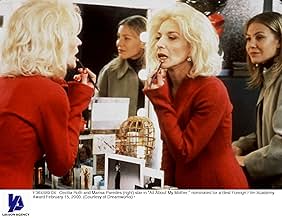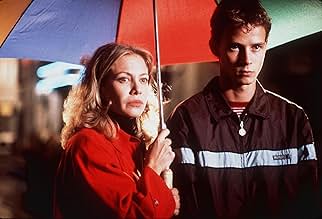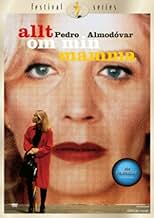NOTE IMDb
7,8/10
108 k
MA NOTE
Le jeune Esteban veut devenir écrivain et découvrir l'identité de son père que sa mère Manuela lui a soigneusement cachée.Le jeune Esteban veut devenir écrivain et découvrir l'identité de son père que sa mère Manuela lui a soigneusement cachée.Le jeune Esteban veut devenir écrivain et découvrir l'identité de son père que sa mère Manuela lui a soigneusement cachée.
- Réalisation
- Scénario
- Casting principal
- Récompensé par 1 Oscar
- 59 victoires et 40 nominations au total
Antonia San Juan
- Agrado
- (as Antonia Sanjuan)
Rosa Maria Sardà
- Madre de Rosa
- (as Rosa María Sardá)
Yael Barnatán
- Yael
- (as Yael Bernatán)
Avis à la une
What I like most about Almodovar's films, this one in particular, is the way he will grab you and pull you into a world you would not normally know and then, confront you with people's lives, emotions, relationships. Manuela, the mother who at the beginning seems so in control and clinical, earnest in her love and with the best intentions for her son, is shown to be much like you and me... full of doubts, questions, a need for answers and trying to understand how her life course has brought her to the present day and made her who she is. Barcelona in winter is richly filmed and serves as a backdrop for the renewing of old satisfying friendships and the budding of new ones, happening simultaneously and somewhat unexpectedly. It rings so true. The slow realisation that we are never really complete, that it's the people we love and live with, or avoid and later regret having done so, that makes us who we are. Almodovar sees the human condition and paints it carefully in this film.
Almodovar has really matured. 'Women on the Verge' was a lot of fun, but ultimately fairly superficial. In recent years, he seems to have started to turn his back on kinky sex and excessive behaviour, and probe the human psyche with a lot more depth and subtlety. This tender film is the latest stage in this ascending path, and very welcome it is, too.
Cecilia Roth's performance is utterly convincing - profound, varied, humane. The other characters are strongly drawn, too. The photography is excellent, and even the tricksy shots aren't too distracting. The narrative is not without surprises (the tragic event early in the film is called to mind constantly without ever becoming maudlin). It's a little slow in places, and there are moments of unintentional humour, but overall this represents the best work of this director that I have seen.
Cecilia Roth's performance is utterly convincing - profound, varied, humane. The other characters are strongly drawn, too. The photography is excellent, and even the tricksy shots aren't too distracting. The narrative is not without surprises (the tragic event early in the film is called to mind constantly without ever becoming maudlin). It's a little slow in places, and there are moments of unintentional humour, but overall this represents the best work of this director that I have seen.
I've watched this masterpiece by Almodovar four times. Each time I unearth new sequences of pure unadulterated truth, beauty, and genius. It is just a totally compelling and amazingly insightful comedy-tragedy that works on so many levels.
Cecilia Roth is an Almodovar favorite, and there's no mystery as to why this is the case. She can express tragedy, wisdom, and an appreciation of dark humor only with her eyes and facial positioning, and express all three vividly at the same time. Her voice also is as commanding of respect as it is sexy and fragile.
Almodovar eye for visual poems of incongruity reaches a new pinnacle in this masterpiece. First, there is the haunting by-play of darkness and light preceding Roth coming to the rescue of El Agreado. Much later, we are treated to the brightness of the upscale restaurant Roth where Roth waits for her ex-husband Lola juxtaposed with a merciless exploration of the vast dark despair of Lola's eyes. Between these bookend-style frames, the profound dualities abound.
If you see one foreign language film per year, make this your next one.
Cecilia Roth is an Almodovar favorite, and there's no mystery as to why this is the case. She can express tragedy, wisdom, and an appreciation of dark humor only with her eyes and facial positioning, and express all three vividly at the same time. Her voice also is as commanding of respect as it is sexy and fragile.
Almodovar eye for visual poems of incongruity reaches a new pinnacle in this masterpiece. First, there is the haunting by-play of darkness and light preceding Roth coming to the rescue of El Agreado. Much later, we are treated to the brightness of the upscale restaurant Roth where Roth waits for her ex-husband Lola juxtaposed with a merciless exploration of the vast dark despair of Lola's eyes. Between these bookend-style frames, the profound dualities abound.
If you see one foreign language film per year, make this your next one.
Very few directors, since Bunuel, Fassbinder, Lindsay Anderson and Roman Polanski, have been able to translate their own, very private universes, to the screen. That is why, it divides audiences in such a radical way.
You love it or you hate it. I think, that is the final objective of an artist, to express their view, to give us their own version of the world we live in. It enriches us, it makes us more aware of the million faces of human nature. Thanks to Almodovar we're allowed to feel identified with, what we may consider, marginal characters. What a different experience is to sit through an Almodovar film and a Ron Howard film for instance. Almodovar remains, becomes part of us, Ron Howard's vanishes as we're leaving the movie theater.
You love it or you hate it. I think, that is the final objective of an artist, to express their view, to give us their own version of the world we live in. It enriches us, it makes us more aware of the million faces of human nature. Thanks to Almodovar we're allowed to feel identified with, what we may consider, marginal characters. What a different experience is to sit through an Almodovar film and a Ron Howard film for instance. Almodovar remains, becomes part of us, Ron Howard's vanishes as we're leaving the movie theater.
I came to this film wanting to hate it, but I was seduced by it and it affected me deeply. Why hate? Because I had just seen a TV documentary about Almodovar. He talks a good deal of shallow rubbish, and the showbusiness darlings who surround him are vile. However, his film speaks with the sincere voice of artistic talent. It even has a touch of greatness.
It is a film about Woman. Almodovar is well-known for his preoccupation with feminine sensibility, and here we go through the range of female awarenesses - Madre, Puta, Actriz. This is not the 'macro' masculine world of war and politics, but the feminine 'micro' universe of caring, loving and suffering. In a real sense, it is "All About Eve".
Manuela loves her son Esteban totally and unconditionally. When he is taken from her, she must forge a new life. Back in her native Barcelona she finds fulfilment caring for Rosa the pregnant nun and Huma the barren actress. A new Esteban appears, and the cycle of living and loving begins again.
This flimsy summary of the story gives no real idea of the film's symbolic and dramatic richness. It is a pattern made of other patterns, with stories repeating, reversing and overlapping endlessly. Names can mean a break with the past (Agrado, Huma) or they can insist on continuity (Rosa, Esteban). In the guignol tradition, names can also delineate character - Agrado tries to make life agreeable for others, Huma Rojo is red smoke, a hollow illusion, and Nina is an adult with a child's personality.
Almodovar deliberately offends against social custom. Women are fathers, birth means death and drama is more real than life. It is tempting to think of Almodovar as the new Bunuel, and he takes the same childish pleasure in shocking the 'decent' Spanish bourgeoisie. When Agrado gives her performance in the theatre, the old folks walk out in disgust while the youngsters stay and are entertained.
"This play marked my life," says Manuela of 'A Streetcar Named Desire'. It made her a mother (the defining experience of her existence) because it introduced her to Lola. She explains that she played Stella and Lola played Kowolski, literally and figuratively. The male symbol is brutal and cruel, the female symbol is the nurturer of life who endures abuse because she loves. Like Stella, Manuela escaped, pregnant and alone. The play returns later as Esteban's birthday treat and the cause of his death. Manuela knows the text by heart, and when she follows the production to Barcelona, fate pulls her into the drama and she triumphs as Stella. Huma is Blanche, the sad derelict, "relying on the kindness of strangers". (Another link with the play is the title of Almodovar's own production company, "Deseo".)
Esteban's delight with his new book is shown in the reading of the foreword - "es un prefacio maravilloso!" The film, similarly, has a marvellous preface. A bag of plasma drips purposefully, its valve shaped like a crucifix. The symbolism is rich and catholic, and prepares us for what will come - here is a figurative mother, giving the blood of life and suffering the cross of sorrow. Taps, console and graph represent institutionalised care, as opposed to the natural, personal care of a mother. These things are neat and orderly, but cold and soulless. This is the organ donation unit of a hospital. It does excellent work, but we see its effort in fragments rather than a whole. The files list organs, not people - 'higado', 'corazon'. Technology can help us, but it can never replace maternal love. We feel uneasy when we are told that "the machine is breathing for him".
Manuela works as a nurse (symbol of the nurturing mother) in this unit, and we see her as an actress appearing in a training video, playing a mother whose son is dead. Two doctors ask for the boy's organs. New life must be nourished from his body's wreckage. When the scene is repeated for real, it is almost too painful to watch. Almodovar takes us to the 'meta' level, with Manuela's anguish setting up cross-rhythms with her professionalism. Love is stronger than systems, and the organ co-ordinator weeps for Manuela.
The real Manuela stands tiny before a vast advert for 'Streetcar', showing Huma's face. Is the image more potent than the individual? Or is Almodovar saying that superficial impact fades, whereas human empathy endures? What is the relationship between the true woman and her made-up face? Esteban dies pursuing the 'red smoke' of an actress's fame. If he had stayed with his real mother and not chased an illusion, he would have been safe.
Esteban will bestow new life. We go with Manuela as she follows her son's heart to Coruna, where another young man has hope restored. The mulch of death feeds the roots of life. Manuela knows two places, Spain's first and second cities, Madrid and Barcelona (importantly for Almodovar, these are the two pre-eminently 'modern' towns). She moves between them along the tunnel umbilicus, as a pregnant teenager, childless mother and finally as triumphant madonna with the 'new' Esteban.
The spectacular vista of Barcelona and sumptuous portal of Gaudi's Sagrada Familia rapidly disappear, and we are soon in an ugly wasteland where prostitutes parade as grotesques in a hell worthy of Goya. These two Barcelonas recur again and again - the outward city of quirky, appealing architecture and the mean streets of the hopeless, directionless underclass.
Almodovar's narrative has been engrossing up to this point. Now it will expand and deepen as a new cast of characters is woven into the film's fabric.
"Que raro!"
It is a film about Woman. Almodovar is well-known for his preoccupation with feminine sensibility, and here we go through the range of female awarenesses - Madre, Puta, Actriz. This is not the 'macro' masculine world of war and politics, but the feminine 'micro' universe of caring, loving and suffering. In a real sense, it is "All About Eve".
Manuela loves her son Esteban totally and unconditionally. When he is taken from her, she must forge a new life. Back in her native Barcelona she finds fulfilment caring for Rosa the pregnant nun and Huma the barren actress. A new Esteban appears, and the cycle of living and loving begins again.
This flimsy summary of the story gives no real idea of the film's symbolic and dramatic richness. It is a pattern made of other patterns, with stories repeating, reversing and overlapping endlessly. Names can mean a break with the past (Agrado, Huma) or they can insist on continuity (Rosa, Esteban). In the guignol tradition, names can also delineate character - Agrado tries to make life agreeable for others, Huma Rojo is red smoke, a hollow illusion, and Nina is an adult with a child's personality.
Almodovar deliberately offends against social custom. Women are fathers, birth means death and drama is more real than life. It is tempting to think of Almodovar as the new Bunuel, and he takes the same childish pleasure in shocking the 'decent' Spanish bourgeoisie. When Agrado gives her performance in the theatre, the old folks walk out in disgust while the youngsters stay and are entertained.
"This play marked my life," says Manuela of 'A Streetcar Named Desire'. It made her a mother (the defining experience of her existence) because it introduced her to Lola. She explains that she played Stella and Lola played Kowolski, literally and figuratively. The male symbol is brutal and cruel, the female symbol is the nurturer of life who endures abuse because she loves. Like Stella, Manuela escaped, pregnant and alone. The play returns later as Esteban's birthday treat and the cause of his death. Manuela knows the text by heart, and when she follows the production to Barcelona, fate pulls her into the drama and she triumphs as Stella. Huma is Blanche, the sad derelict, "relying on the kindness of strangers". (Another link with the play is the title of Almodovar's own production company, "Deseo".)
Esteban's delight with his new book is shown in the reading of the foreword - "es un prefacio maravilloso!" The film, similarly, has a marvellous preface. A bag of plasma drips purposefully, its valve shaped like a crucifix. The symbolism is rich and catholic, and prepares us for what will come - here is a figurative mother, giving the blood of life and suffering the cross of sorrow. Taps, console and graph represent institutionalised care, as opposed to the natural, personal care of a mother. These things are neat and orderly, but cold and soulless. This is the organ donation unit of a hospital. It does excellent work, but we see its effort in fragments rather than a whole. The files list organs, not people - 'higado', 'corazon'. Technology can help us, but it can never replace maternal love. We feel uneasy when we are told that "the machine is breathing for him".
Manuela works as a nurse (symbol of the nurturing mother) in this unit, and we see her as an actress appearing in a training video, playing a mother whose son is dead. Two doctors ask for the boy's organs. New life must be nourished from his body's wreckage. When the scene is repeated for real, it is almost too painful to watch. Almodovar takes us to the 'meta' level, with Manuela's anguish setting up cross-rhythms with her professionalism. Love is stronger than systems, and the organ co-ordinator weeps for Manuela.
The real Manuela stands tiny before a vast advert for 'Streetcar', showing Huma's face. Is the image more potent than the individual? Or is Almodovar saying that superficial impact fades, whereas human empathy endures? What is the relationship between the true woman and her made-up face? Esteban dies pursuing the 'red smoke' of an actress's fame. If he had stayed with his real mother and not chased an illusion, he would have been safe.
Esteban will bestow new life. We go with Manuela as she follows her son's heart to Coruna, where another young man has hope restored. The mulch of death feeds the roots of life. Manuela knows two places, Spain's first and second cities, Madrid and Barcelona (importantly for Almodovar, these are the two pre-eminently 'modern' towns). She moves between them along the tunnel umbilicus, as a pregnant teenager, childless mother and finally as triumphant madonna with the 'new' Esteban.
The spectacular vista of Barcelona and sumptuous portal of Gaudi's Sagrada Familia rapidly disappear, and we are soon in an ugly wasteland where prostitutes parade as grotesques in a hell worthy of Goya. These two Barcelonas recur again and again - the outward city of quirky, appealing architecture and the mean streets of the hopeless, directionless underclass.
Almodovar's narrative has been engrossing up to this point. Now it will expand and deepen as a new cast of characters is woven into the film's fabric.
"Que raro!"
Le saviez-vous
- AnecdotesAgrado's monologue was based on a real life event. When the electronic system of an Argentinian theater failed, the director suspended the show. Actress Lola Membrives decided to give the news to the audience and make them an offer: if they'd stay, they could listen to the narration of her life.
- Versions alternativesThree minutes are cut from the US version. The total running time of the Spanish version is 104 minutes.
- Bandes originalesGorrión
Written by Dino Saluzzi
Performed by Dino Saluzzi (bandoneon), Marc Johnson and José Saluzzi
Courtesy of ECM Records
(from "Cité de la musique" 1997)
Meilleurs choix
Connectez-vous pour évaluer et suivre la liste de favoris afin de recevoir des recommandations personnalisées
- How long is All About My Mother?Alimenté par Alexa
Détails
- Date de sortie
- Pays d’origine
- Langues
- Aussi connu sous le nom de
- Todo sobre mi madre
- Lieux de tournage
- Sociétés de production
- Voir plus de crédits d'entreprise sur IMDbPro
Box-office
- Montant brut aux États-Unis et au Canada
- 8 344 738 $US
- Week-end de sortie aux États-Unis et au Canada
- 50 362 $US
- 7 nov. 1999
- Montant brut mondial
- 67 958 231 $US
- Durée
- 1h 41min(101 min)
- Couleur
- Mixage
- Rapport de forme
- 2.35 : 1
Contribuer à cette page
Suggérer une modification ou ajouter du contenu manquant

![Regarder Tráiler [OV]](https://m.media-amazon.com/images/M/MV5BY2IzY2ZlNWQtMjllYi00ZGI4LThhZDEtZWE2MzQ2NzkzMjNlXkEyXkFqcGdeQXRyYW5zY29kZS13b3JrZmxvdw@@._V1_QL75_UX500_CR0)


































